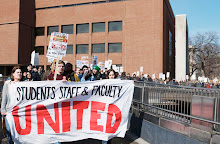A document regarding budget cuts from the 1930s was disseminated to faculty senators before yesterday's Senate meeting: http://www.docstoc.com/docs/27648126/budget-issues-from-1930s
One notable difference between what was done then and what is being proposed now is that the regents voted for sliding scale paycuts: "The regents put into effect a slash of 20% on that part of any salary over $3600; of 15% on that part between $2400 and $3600; of 10% on that part between $1100 and $2400, but left without reduction salaries and wages up to and including the figure $1200 a year." Across the board furloughs are regressive, and furloughs are a temporary solution, not a fix for our budget woes. Our highly paid administrators were apparently incapable of planning for a 27th pay period in their elaborate budget models, and are scrambling to cover the $41m. The administration's 2% raise only adds to recurring costs, and will be paid for with furloughs and layoffs of staff. The budget should not be balanced on the backs of the lowest-paid members of the University community. Salary cuts should be on the table. But before faculty roll over and "take one for team," the administration must engage with us to redefine priorities, reform university governance, and provide transparent and easily interpretable data about how tuition dollars, cost pools, and state funding are being spent. Faculty veto power on the furloughs gives us an opportunity to stop business as usual and to RECLAIM THE U!
Friday, March 5, 2010
Subscribe to:
Post Comments (Atom)


So What Does the University of Minnesota's Regent's Policy Say About Reduction or Postponement of Faculty Compensation?
ReplyDeleteMy fellow U of M alum and friend, Michael McNabb, points out:
From the Regents' Policy on Faculty Tenure
[with editorial comments in capital letters or in brackets]:
Section 11.3 FIRST Stage: ALTERNATIVE Approaches. IF there has been a serious reduction in INCOME . . .
[There has not been a reduction in income; the increases in tuition have offset the decreases in state appropriations that are the result at least in part of the failed legislative strategy of the administration.]
The president will identify the magnitude of the shortfall, the measures which might be taken to alleviate it (which MUST NOT involve the impairment of faculty rights), and alternative measures which have been rejected. The president will give the committee FULL ACCESS to all available information and WILL RESPOND SPECIFICALLY to additional proposals suggested by the committee. At this stage the University will consider reductions in OTHER EXPENSES
[such as the costs of administration and the annual multi-milion dollar subsidy to the athletic department]. . . .
Section 11.4 SECOND Stage: Reduction or Postponement of Compensation. IF the University has implemented ALL of the measures which are required to be considered in the first stage . . . and they are inadequate to meet the shortfall, the president may, AFTER consultation with the Faculty Consultative Committee, propose the TEMPORARY reduction or postponement of faculty compensation for a predetermined period NOT TO EXCEED one year . . . . The Faculty Consultative Committee will report on the adequacy of the steps taken in the first stage and make its recommendations on the proposal. If the Faculty Senate approves the proposed action (or any modification of it) by an ABSOLUTE MAJORITY of its membership or by a TWO-THIRDS vote of the members present and voting (a quorum being present), the Board of Regents may take the action . . . .
See http://www1.umn.edu/regents/policies/humanresources/FacultyTenure.pdf
My own comment: It does not appear that the procedure outlined above has been followed. If a vote is taken at the faculty senate before all the required steps have been taken, then the faculty senate has only itself to blame for the consequences.
University of Minnesota Furloughs Conditional on Financial Stringency
ReplyDeleteFinancial Stringency?
What Does the Tenure Code Say About This?
From the Tenure Code:
4.5 Reduction Or Postponement Of Compensation. If the University or a collegiate unit is faced with financial stringency that does not amount to a fiscal emergency, the president may propose a temporary reduction or postponement in compensation to be allocated to faculty in accordance with a mathematical formula or similar device. If approved by the Faculty Senate or the appropriate collegiate assembly, respectively, and the Board of Regents, the recurring salary of all faculty members in the University or in the designated collegiate units shall be reduced temporarily in accordance with the formula or device. The reduction may not continue for longer than two years, unless renewed by the same procedure.
3. Interpretation of Section 4.5: Financial Stringency.
Financial stringency in section 4.5 is understood to mean financial difficulties that are unusual in extent and require extraordinary rather than ordinary responses. Section 11 may be invoked if the regents are “faced with the necessity of drastic reduction in the University budget,” reductions so severe that they may “threaten [the] survival” of the University. It is understood that the financial difficulty that would permit the president to propose temporary reductions or postponements in compensation under section 4.5 is less severe than the “fiscal emergency” outlined in section 11, but it is also understood that “financial stringency” should not be invoked to respond to foreseeable fluctuations in the University’s budget and finances.
Is the interpretation by the FCC of the Regents Policy on Faculty Tenure and Furloughs Correct?
ReplyDeletePlease see:
http://ptable.blogspot.com/2010/03/is-interpretation-of-regents-policy-on.html
Humorous find of the day...
ReplyDeleteFrom Inside Iowa State - for Faculty and Staff:
The Faculty Senate's spring conference,"Refocusing the Academy in Light of the Current Budget Constraints," is scheduled for April 30 (10:30 a.m.-1 p.m., MU Great Hall). Tom Sullivan, senior vice president and provost at the University of Minnesota, Minneapolis, will headline the event. Executive vice president and provost Elizabeth Hoffman and distinguished professor John Schuh, educational leadership and policy studies, also are slated to speak.
I hope the Iowa State folks consider the actions of Provost Sullivan rather than his words...
For example - posts on Periodic Table:
Let's Make Her An Offer She Can't Refuse...
Faculty Senate Disapproves Engulfment of the Graduate School by Office of the Provost
Trust Me, I'm a Lawyer
Hiring Pause, Thinking Freeze